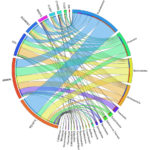In Cell Genomics, an international consortium led by researchers at the Joint Genome Institute team generated 824 new Actinobacteria genomes, which were were combined with nearly 5,000 publicly available ones and 1,100 metagenome-assembled genomes (MAGs) reconstructed from sequenced environmental samples in a previous study.
JGI Leads Large-Scale Effort to Develop a Genomic Catalog of Earth’s Microbiomes
Microorganisms play key roles in regulating global nutrient cycles but only a small fraction has been identified and an even smaller number has been successfully cultured in a lab for study. In Nature Biotechnology, the known diversity of bacteria and archaea has now expanded by 44% through a publicly available collection of more than 52,000 microbial genomes from environmental samples. Of that number, 70% of the novel genome sequences were previously unknown, not yet cultured in the lab. The work results from a JGI-led collaboration involving more than 200 scientists around the world, KBase and NERSC. Read more about the genomic catalog of Earth’s microbiomes on the JGI website.
JGI Scientists Pen Genome Watch Articles
Tanja Woyke and other JGI researchers made their debut writing for a column of the prestigious scientific research magazine Nature Reviews Microbiology last year — and there’s more to come in 2020. In 2018, Woyke received a message from Andrea Du Toit, senior editor for Nature Reviews Microbiology, with an unusual opportunity: would JGI researchers consider regularly writing for the magazine’s column Genome Watch? The column appears in six issues of the monthly magazine each year.
Du Toit invited JGI to write half of the 2019 Genome Watch articles as a way to expose readers to a broader genomics perspective. Woyke spread the word among her JGI colleagues, and they agreed, providing three articles for the journal with Du Toit as their editor. The partnership has proven so successful this year, JGI is providing another three Genome Watch articles. Go here to read the blog post on the JGI website.
JGI Researchers Release 1000+ Microbial Reference Genomes
Department of Energy Joint Genome Institute (DOE JGI) and Biosciences Environmental Genomics and Systems Biology (EGSB) division researchers have released 1,003 reference genomes for diverse bacteria and archea isolated from environments ranging from sea water and soil, to plants, and to cow rumen and termite guts. The release is the largest to date from JGI’s Genomic Encyclopedia of Bacteria and Archaea (GEBA) initiative, which seeks to fill in unexplored branches of the tree of microbial life. JGI’s Supratim Mukherjee and Rekha Seshadri were co-first authors on the paper published in Nature Biotechnology; senior author Nikos Kyrpides and co-authors Natalia Ivanova, Axel Visel, Tanja Woyke, and Yasuo Yoshikuni have secondary affiliations with EGSB. The genomes are publicly available through the Integrated Microbial Genomes with Microbiomes (IMG/M) system. Read more on the JGI website.
Was this page useful?







